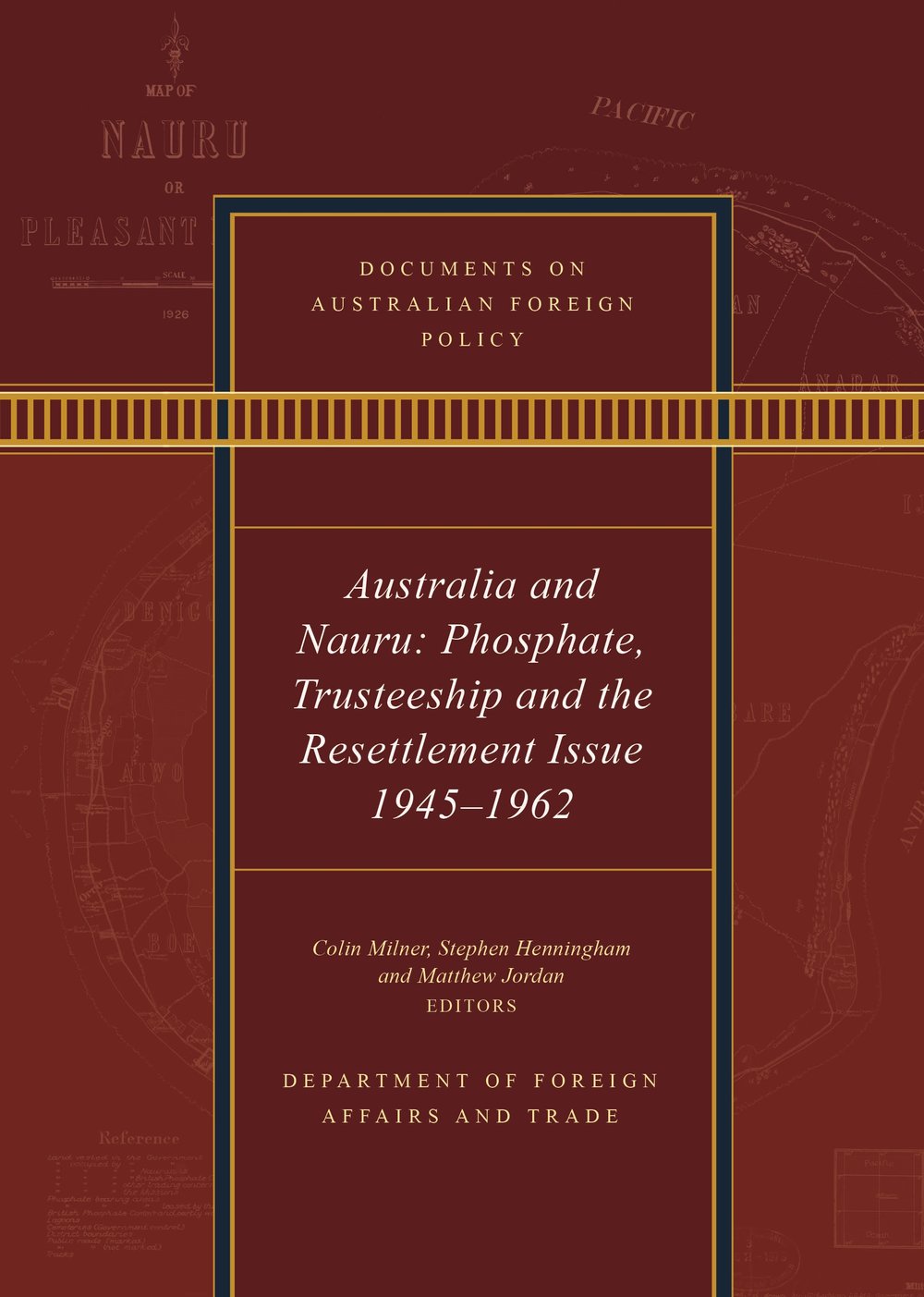Documents on Australian Foreign Policy
Australia and Nauru: Phosphate, Trusteeship and the Resettlement Issue, 1945–1962

The 374 documents selected for this volume – many of them not previously publicly available – illuminate the context, implementation, and development of Australian policies towards the South Pacific island of Nauru from 1945 to 1962.
While administering Nauru under a League of Nations’ mandate (from 1920) and then under a UN trusteeship (from 1947), Australia’s primary interest was accessing Nauru’s phosphate and providing it to Australian – and New Zealand – farmers at a very favourable price. The British Phosphate Commissioners (BPC) and their staff managed this extraction on behalf of Australia and its partners, New Zealand and the United Kingdom, with the heavy work done by Chinese and other imported labourers. Phosphate extraction was interrupted in 1942, when Japanese troops took over the island. Later, as the tide of war turned, Australian ministers lobbied strenuously but unsuccessfully for US support for the early recapture of Nauru. After Japan’s surrender, the three partner governments, through the BPC, ensured the prompt replacement of war-damaged infrastructure so that extraction and export could resume.
Australia’s post-war External Affairs Minister, H. V. Evatt, took a leading part in establishing the UN Trusteeship system as an improved, more progressive version of the League’s mandate system and in securing trusteeships over Nauru and New Guinea. As under the mandate, Australia shared its authority over Nauru with New Zealand and the United Kingdom. Australia diligently fulfilled its administering obligations and mostly received a sympathetic hearing from the UN Trusteeship Council in the late 1940s and 1950s. From around 1960, however, UN support for the rapid decolonisation of the remaining Western colonial territories strengthened, forcing Australia to modify its approach.
The Trusteeship Council encouraged Australia’s efforts to find a ‘new island home’ in the Pacific on which to resettle the Nauruans, in order to give them a more economically viable future once the phosphate was exhausted. But a wide search came to naught. Instead, in 1960, after consultation with its partners – and despite its restrictive immigration policy – Australia offered the Nauruans the opportunity to migrate to Australia. But they rebuffed this offer, fearing their disappearance as a distinct community.
As the documents also show, the decision to decline resettlement in Australia was part of a broader pattern of increased Nauruan assertiveness. They lobbied for increased royalties from phosphate extraction, with some success: between 1940 and 1960, royalty payments doubled. In the late 1940s, their petitions to the United Nations led to the early recall of an unpopular Australian Administrator. Their repeated calls for a greater share of political authority, however, were less successful, largely because the Australian Government feared that this would lead to corresponding demands for greater control over the phosphate industry.

Colin Milner, LLB (Sydney University), is a former official of the Australian Department of Foreign Affairs and Trade (DFAT) who served as Special Representative to Nauru in 2004–05 and Acting High Commissioner in 2013. Currently a PhD candidate in the Australian National University’s School of History, he is preparing a thesis on the factors that shaped the world view of the distinguished Australian constitutional lawyer and public servant Robert Randolph Garran. He has produced several publications in this area, focusing in particular on Garran’s activities as the Commonwealth’s first Attorney-General from 1901–1932.
Stephen Henningham, BA Hons (UNSW), PhD (ANU), is a specialist historian in DFAT’s Historical Publications Section. With the late Bruce Hunt, he has co-edited two volumes on Australia and Papua New Guinea in the Documents on Australian Foreign Policy (DAFP) series. He has also published on aspects of the history of late-colonial India and on the politics and history of the South Pacific region, including Papua New Guinea. He was the senior civilian official in the Peace Monitoring Group in Bougainville in 2001–2 and served as an Australian diplomat in New Caledonia, Papua New Guinea and Samoa.
Matthew Jordan, BA Hons, PhD (Sydney University) is Head of DFAT’s Historical Publications Section and General Editor of Documents on Australian Foreign Policy. He has published mostly on Australian foreign policy history, focusing especially on the role played by ideas of race and nation in shaping Australia’s attitudes to the world. Having published a DAFP volume on Australia and the Rhodesian Problem, 1961–1972 (UNSW Press, 2017), he is now working on a follow-up volume on Australia’s approach to Zimbabwean independence in the 1970s and 1980s. He is also finalising a documentary history of the liberalisation and abolition of the White Australia policy from the 1940s to the 1970s.
